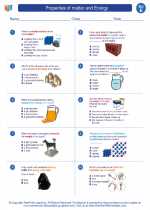Properties of matter and Energy -> greases
Greases
Grease is a semisolid lubricant composed of a base oil, thickening agent, and additives. It is used to reduce friction and wear between moving parts, and to protect them from corrosion. Greases are commonly used in automotive, industrial, and household applications.
Composition
The base oil in grease can be mineral oil, synthetic oil, or a combination of both. The thickening agent, also known as the soap, gives the grease its semi-solid consistency. Common thickening agents include lithium, calcium, and aluminum soaps. Additives are included to enhance the performance of the grease, such as anti-wear agents, corrosion inhibitors, and extreme pressure additives.
Properties
Greases have several important properties:
- Consistency: Grease can range from soft to very stiff, depending on the thickening agent and base oil used.
- Dropping Point: This is the temperature at which the grease transitions from a semi-solid to a liquid state. It is an important factor in high-temperature applications.
- Water Resistance: Some greases are formulated to resist washing out by water, making them suitable for applications exposed to moisture.
- Compatibility: Greases should be compatible with other lubricants and materials they come into contact with.
Applications
Greases are used in a wide variety of applications, including:
- Automotive: Wheel bearings, chassis parts, universal joints
- Industrial: Bearings, gears, conveyors, machinery
- Household: Hinges, locks, garden tools
Selection and Maintenance
When selecting a grease for a specific application, factors to consider include the operating temperature, load, speed, and environmental conditions. It's important to follow manufacturer recommendations for relubrication intervals and to clean the application area before reapplying grease. Over-greasing should be avoided as it can lead to overheating and other issues.
Study Guide
Use the following questions to test your understanding of greases:
- What are the main components of grease?
- How does the dropping point of grease affect its performance?
- Give examples of automotive, industrial, and household applications for grease.
- What properties should be considered when selecting a grease for a specific application?
- Why is over-greasing a concern, and how can it be avoided?
[Greases] Related Worksheets and Study Guides:
.◂Science Worksheets and Study Guides Fifth Grade. Properties of matter and Energy

 Worksheet/Answer key
Worksheet/Answer key
 Worksheet/Answer key
Worksheet/Answer key
 Worksheet/Answer key
Worksheet/Answer key
 Vocabulary/Answer key
Vocabulary/Answer key
 Vocabulary/Answer key
Vocabulary/Answer key
